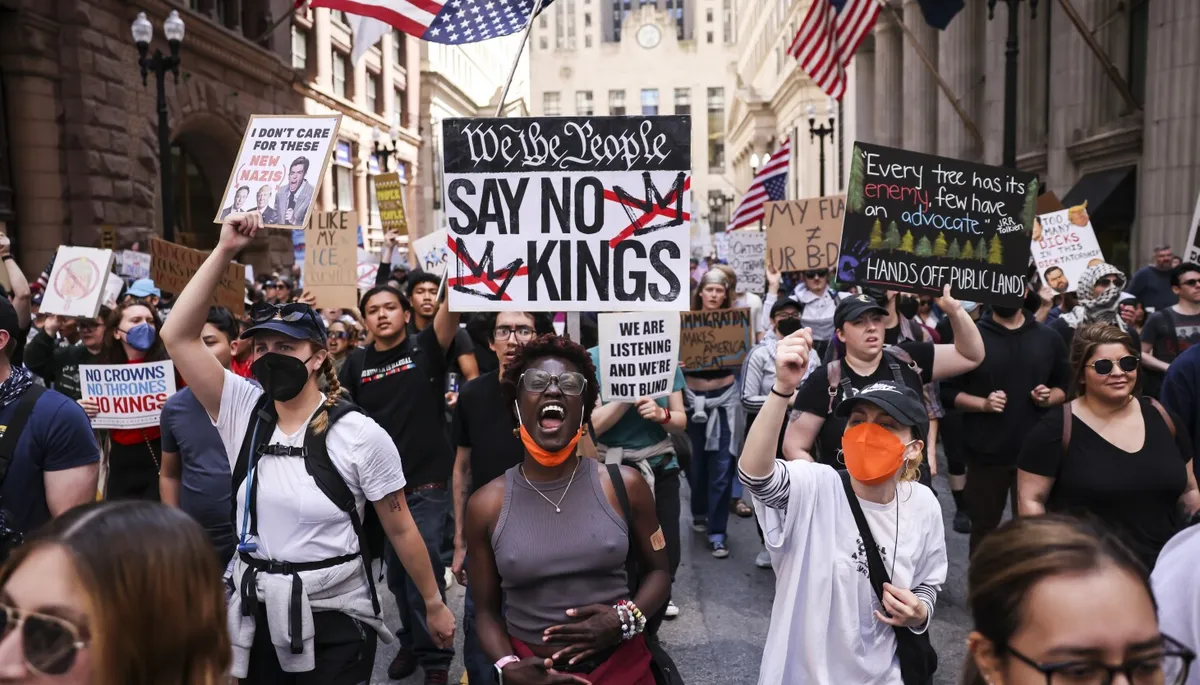
On Saturday, thousands of people gathered in Chicago and cities across the nation for coordinated “No Kings” protests, voicing their opposition to the Trump administration policies that many believe are steering the country toward authoritarianism. These rallies occurred in downtown Chicago and several suburbs including Evanston, Oak Park, Des Plaines, Highland Park, and Geneva, as well as in small towns throughout the United States. The demonstrations were strategically organized to coincide with a military parade in Washington, D.C., celebrating the Army’s 250th anniversary and President Trump’s 79th birthday.
“We’re in a situation that is a crisis that is deepening every day, with the weaponization of the military against people, with the kidnapping and disappearing of our neighbors, with the stealing of our resources to give to billionaires,” stated Kathy Tholin, chair of the board for Indivisible Chicago, a key organizer of the Loop protest. “And this is an opportunity for Chicago to say, ‘No, we don’t have kings in this country. We don’t want chaos and cruelty. And we don’t want this country to be in the service of billionaires.’”
The protests emerged amid heightened tensions regarding recent actions by President Trump, who dispatched 2,000 National Guard troops and 700 Marines to Los Angeles. This marked the first time in sixty years that a U.S. president had called in the National Guard without a state governor's request. Trump justified this unprecedented action as a means to protect federal property amid protests concerning his administration's immigration policies, labeling demonstrators as “paid insurrectionists.” Such actions have drawn sharp criticism from Democratic leaders and protesters, who accuse Trump of overstepping his authority and labeling him an autocrat.
In Chicago, protesters chanted slogans such as “No kings since 1776” and “Citizen not subject,” urging the public to reject the notion of being ruled by a “fuhrer.” U.S. Senator Dick Durbin, addressing the crowd at Daley Plaza, remarked, “When I look out at this gathering, I don’t see Daley Plaza. I see America. I see a country that decided in 1776: No kings in America.” Despite the large turnout, Chicago police reported only one arrest during the event.
The protests took place in the wake of shocking political violence in Minnesota, where the recent assassinations of State Representative Melissa Hortman and her husband occurred, as well as a separate shooting that injured a state senator and his wife. Following these events, Minnesota organizers canceled their planned “No Kings” demonstrations, opting instead for a moment of silence for the victims in Chicago.
In Atlanta, the “No Kings” rally reached its capacity of 5,000, with many more demonstrators gathered outside. Philadelphia saw a light rain fall as marchers gathered in Love Park, chanting “Whose streets? Our streets!” as they made their way to the Philadelphia Museum of Art, a location well-known from the movie “Rocky.” In Los Angeles, thousands congregated in front of City Hall, while smaller groups gathered in front of state capitols in Mississippi and Arkansas.
Organizers anticipated around 2,000 “No Kings” protests nationwide, coordinated by groups including the 50501 Movement, which symbolizes the effort of 50 states participating in 50 protests under one unified movement. In the Chicago area, protests were organized by Indivisible Chicago and the ACLU of Illinois. Following their gathering at Daley Plaza, protesters marched down Michigan Avenue and Dearborn Street, passing Trump Tower as police managed crowd control.
Among the crowd, longtime friends Jesse Flores and Brent Showalter brought a symbolic representation of Trump’s military parade, constructed from cardboard and duct tape. Showalter, an artist, expressed the need to highlight the absurdity of the situation, saying, “We just want to make it seem as ridiculous as it is.” Flores shared his personal motivations, noting his partner’s struggles with Medicaid as cuts are debated in Congress, emphasizing the direct impact of these policies on families.
The protests also reflected personal stories of struggle and resilience. Mike Duttge, a Lincoln Square resident, expressed concern for his son’s future in a country where democracy seems threatened. “I’m terrified of what my country is going to look like if we continue down this current path,” he said. Meanwhile, Adela Benitez, a 25-year-old Chicagoan who recently moved from Kansas, carried an El Salvadoran flag. Her family’s long journey towards citizenship and their fears of returning to a violent home country underscored the urgent need for reform within the immigration system.
As the “No Kings” protests unfolded across the nation, the collective voices of citizens united in their demand for a government that serves the people, not billionaires, resonated powerfully, showcasing a vibrant movement against the actions of the Trump administration.